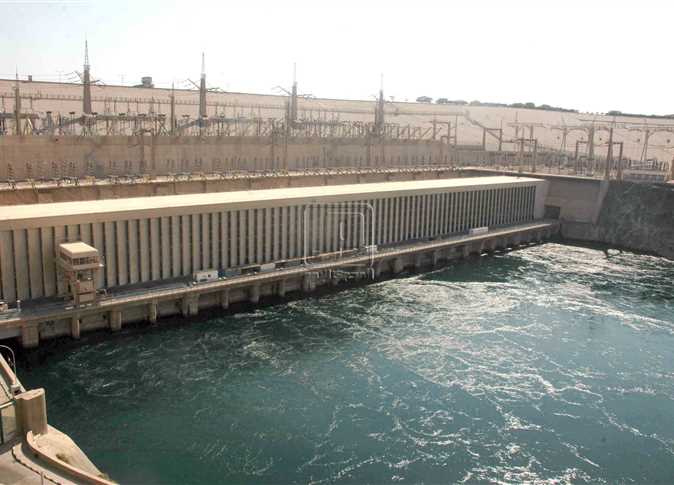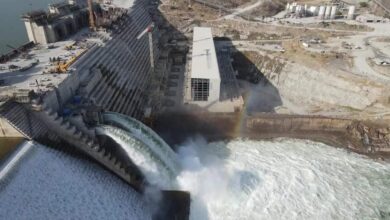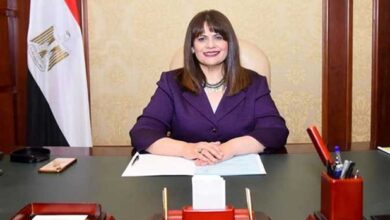Roshdi Saeed, a leading Egyptian geologist and longtime US resident, died Thursday at age 93 in Washington. He was the first Egyptian to obtain a PhD from Harvard University, which he earned in the 1950s.
Engineer Abbas Mahmoud, Saeed’s friend, said Saeed had a brain hemorrhage five days ago and was transported to a hospital, where he died Friday. His funeral is scheduled to be held Monday at St. Mark’s Coptic Church in Virginia.
Mahmoud said he met Saeed 20 years ago, and that he used to meet him every day whenever he would visit Egypt. Both men used to sit at a cafe in downtown Cairo, where they were often joined by others and discussed politics, literature, arts and the economy. Those who knew him said Saeed was known for being good-humored.
Ahmed al-Sayed al-Naggar, a researcher at Al-Ahram Center for Political and Strategic Studies, said on his Facebook account, “Saeed deserves to be honored in a way that suits his status and outstanding contributions to the issues of water, the Nile Basin and for serving Egypt, the country to which he dedicated his life and the best of his thought. He is a pride for all Egyptians.”
Saeed was born in the Shubra in 1920 to a middle-class family that had roots in Assiut. He graduated from the Cairo University Faculty of Science in 1937. Having graduated with honors, he was appointed as a teaching assistant obtaining a scholarship to pursue studies at the Zurich University in Switzerland before returning in 1951.
After obtaining a PhD from Harvard, Saaed became a professor at Cairo University in 1968. Among his numerous contributions to Egypt, he founded the National Mining Organization and headed it until he left the country in 1977.
Saeed had an interest in politics during the 1960s and 1970s, and was an MP and a member of the Inter-Parliamentary Union. He was arrested in September 1981, along with more than 1500 politicians, intellectuals and critics of the 1979 peace treaty with Israel. To afford the cost to permanently emigrate to the US, he sold his science library.
On the lookout for new resources
Saeed’s autobiography, titled “A life journey: Egypt’s resources between Nasser and Sadat,” focuses on Egypt’s sources of wealth and reveals the author’s sadness about the squandering of Egypt’s resources. He believed that if properly exploited, Egypt’s resources could have made the country rich.
In his book, Saeed claims that Egypt was the richest country in the world before the industrial revolution, and blames his country’s downfall on the establishment of Israel in 1948 and on unemployment.
In his book, Saeed also notes that education and scientific research are both in bad shape.
One of his ideas called for the diverting of the Nile to establish urban communities in the desert and setting up a network of transportation and communication networks to support those communities.
He advocated for these communities to be built in the Western Desert between the Mediterranean Sea, the Qattara Depression and the Siwa oasis, because this area of Egypt enjoys moderate weather and a relatively flat topography. This area is also located near natural gas fields, urban centers and the sea, which could be used for cooling purposes for various industries.
Saeed is one of the most prominent experts on the Nile and he has several books on mining, agriculture and irrigation. His lifetime project was dedicated to the development of Egypt and the Egyptians.
Saeed wrote several books, including “The Nile River, Science and Politics in Egypt,” “Egypt’s Geology,” “Truth and Illusion in Egyptian Reality,” and the “Geological Development of the Nile River.”
Saeed played a major role in developing geological institutions in Egypt and in the discovery of several geological finds that enabled the country to make up for the loss of resources following the annexation of Sinai by Israel.
Saeed received an award from an American geological organization in 2003 for his contributions to the field of geology in Egypt and the Middle East, which opened new horizons for oil exploration in the region.




